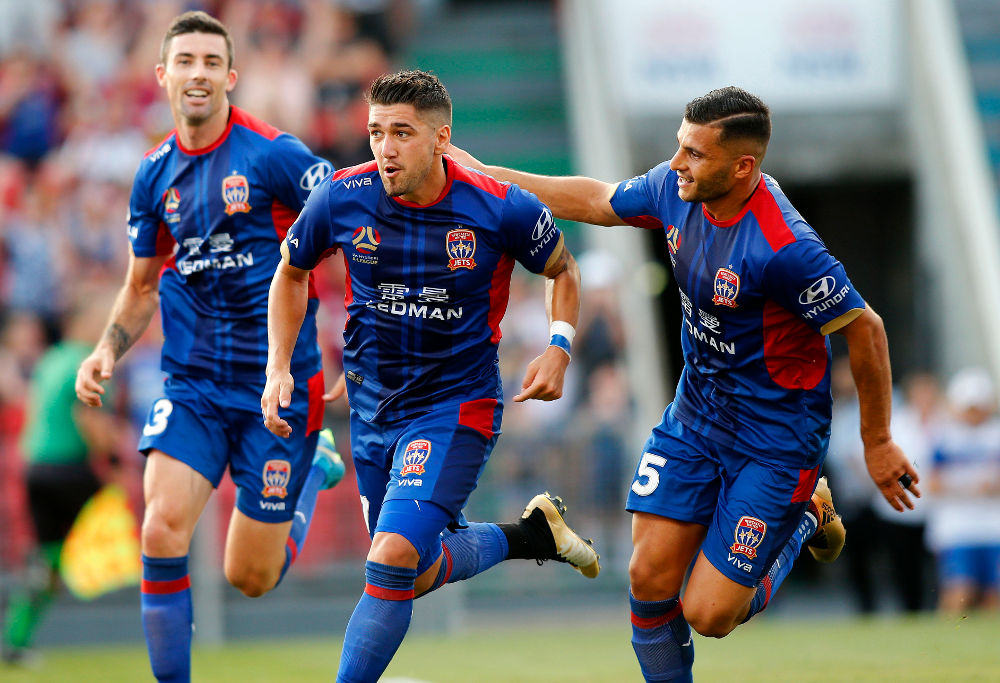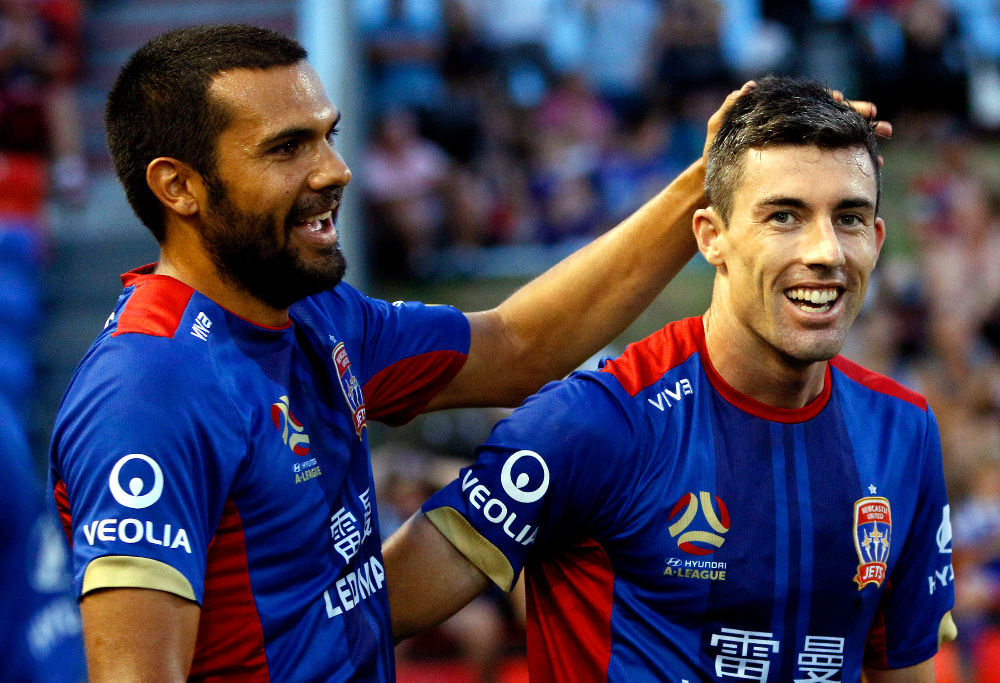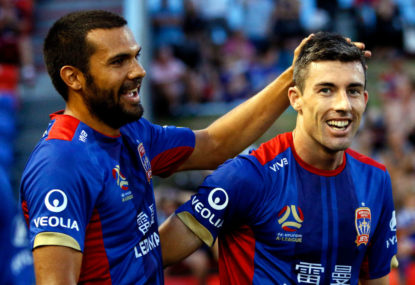Jason Hoffman blew a wide open header from four metres out seven minutes into the match. Nikolai Topor-Stanley rolled in an own-goal after 14 minutes. Jack Duncan blew out his right thigh as the half-hour mark approached.
For Newcastle, the first half was a bundle of bad moments taped loosely together.
During all of this, Ernie Merrick sat calmly on the bench, hardly moving, his slightly grey demeanour unflinching, stoic even. His team tend to hinge on small, glimmering moments, the difference between the Jets failing to score against Perth, and then putting eight past the Mariners – two teams with nearly identical defensive records – is a shimmering hairline edge, and what side of it Newcastle sit on almost depends on the light, or the viewing angle.
Their attack, minimal and efficient, can click and look utterly unstoppable, or, like in the first half here, it clunks and stalls.
Nigel Boogaard was clipping lofted balls over the City defence, in theory playing more into the hands – or feet – of the pacy Rory O’Donovan, than the opposing centre backs.
City, though, have a pair of highly mobile and aerially-capable centre halves, Osama Malik and Bart Schenkeveld. A half-dozen times, Malik was seen lunging to cut out an O’Donovan-bound ball, or rising to head away a pass in flight.
Schenkeveld, as he has done all season, showed his impressive pace in an early footrace with O’Donovan, bustling away and winning out at top speed. Newcastle’s attacking system was not designed for centre-backs as athletic and rangy as City’s. Perhaps this is why they hadn’t beaten City this season.
There was a dissonance to Newcastle’s system too; Dimi Petratos and a fired-up Ronnie Vargas were garnishing the first half with some superb touches. Neat swivels that shed markers and sudden changes in speed and direction made their time on the ball a pleasure to watch.

(AAP Image/Darren Pateman)
There were some excellent one-touch sequences that involved them too, making sharp progress through the City defence and into their box. But then, a minute later, the long clipped balls would resume, approach play that largely bypassed – Vargas in particular – both of these players.
Perhaps Newcastle were valuing variety here, giving the City defence starkly different types of attack to digest and repel in the hope they’d become muddled. In practice, though, it seemed as though Newcastle were simply forgoing a better attacking option for a worse one, for no reason.
Bruno Fornaroli was a frustrating presence for the home crowd; the Uruguayan holds the ball up as well as any striker in the league, but does so by sprawling himself over the front of his marker, like a human shield, leaning back with almost his full weight, arms flailing, studs tearing up turf.
His low centre of gravity and sturdy torso make him an almost immovable object. Invariably, this method wins more fouls than it gives away and every one he squeezed out of the referee was a needle in the home fans’ eyes. Shrieks of Novocastrian anguish accompanied every shriek of the whistle.
Having been treated to what was probably goal of the season last week, when Besart Berisha rotated on his axis to bicycle kick home a winner late in the game, Riley McGree decided to treat us again.
Where Berisha’s effort was just that, all effort, a sort of contorted, heaving moment of genius, McGree’s was a kind of parabolic ideal, executed with a preternatural nonchalance.
Having played a one-two, and running at full speed, the ball was returned to McGree a little behind his run, popping up just behind his trailing leg. Swiftly, and in perfect fluid motion, he brought his heel up to meet the ball, in mid-air. It carved a sublime parabola through the air, and as the stadium – along with Dean Bouzanis, stunned and motionless – watched it fly through the air, the world seemed to slow to some mathematical ideal too. Suddenly nature’s chaotic elements aligned, all discord snapping into harmony.
In a match that had been a flurry of sopping limbs, plagued by imprecision and thrashing against it, a perfect gesture was realised, crafted by a perfect touch. It was a perfect goal.
A goal like that does more than just add a ‘1’ to the scoreboard. It injects a sense of victorious destiny into a team, and it seemed as though Osama Malik – imperious and flawless all evening – was struck by the idea. A sharp Joey Champness cross flew straight to Malik, and he tamely tapped it into Jason Hoffman’s path, right in the middle of the City penalty area.
Hoffman duly finished, curling home with aplomb, and Newcastle were in front. The crowd erupted, writhing in ecstasy. They had persevered, testing Malik over and over, and he had crumbled. It would end up being the winner.

(AAP Image/Darren Pateman)
For City, this goes down as another season of regret. The injuries, the off-field oddities, the inconsistency – both in performance and approach. Although it’s hard to blame them for fading after McGree’s singular input, there was no grit or steel to the way they ended the match.
They finished with half as many balls-into-the-box as Newcastle and failed to test Glen Moss at all in the second half. Daniel Arzani – a Socceroos must, now that his season has finished – stood out all evening, but few others did.
The Jets have gone from cellar-dwellers to grand finalists in the space of a single season. They’ve been flighty, but their success is no fluke. Their semi-final hinged on McGree’s wondergoal, but the switch more likely occurred at some point during halftime. Boogaard was welling up after the match, “It’s something special” he said.































































































